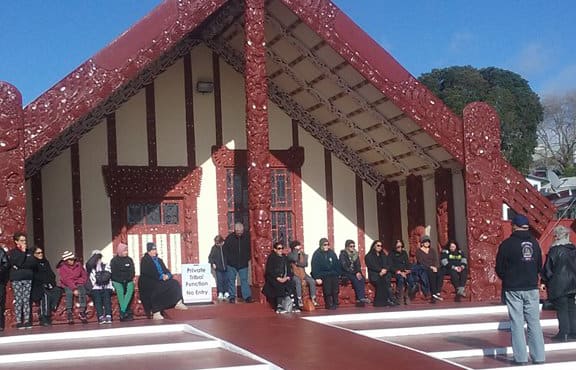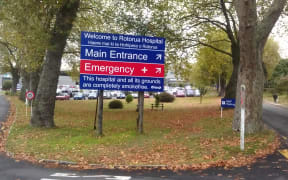More than 200 members of Ngāti Whakaue iwi have marched up Pukeroa Hill, an old Pā site, and into Rotorua Hospital's atrium to protest the axing of their cultural team, Te Hunga Manaaki.

Iwi members gather at Tama te Kapua at Ohinemutu after marching to the Rotorua hospital. Photo: RNZ / Mihingarangi Forbes
Members of Ngāti Whakaue iwi have today been speaking and singing at a peaceful protest and calling for more consultation from Lakes District Health Board.
In 1880, the iwi of Ngāti Whakaue donated the land at Pukeroa Hill for the purposes of a hospital; it was a gift to the people of Rotorua.
For the last 20 years Ngāti Whakaue and the Lakes District Health Board have recognised their relationship through the work of a cultural team called Te Hunga Manaaki, which acts as a bridge between clinical staff and Māori patients and their whānau.
But five full-time staff from the cultural team left the hospital last week after their employer, Kāhui Hauora, lost the contract with the DHB.
Labour Party MP Kelvin Davis said the Māori Party had 'dropped the poi', because they had allowed the iwi-owned and operated service to be 'brushed aside in favour of a government-aligned service'.
Māori Party co-leader Te Ururoa Flavell has said he will look into the axing of Māori cultural ambassadors.
A petition to reinstate the cultural ambassadors has gathered more than 2000 signatures.
A leading Māori health Professor Te Kani Kingi evaluated the cultural team's role and found overwhelming support from clinical, non-clinical and service users.
RNZ has attempted to speak with the Chief Executive of Lakes DHB Ron Dunham but he said it would be "impolite" to speak.
In a statement released yesterday he said a new programme would be created within the hospital.
The DHB said it was concerned iwi were unhappy but it had made the decision with the best of intentions, and as part of the DHB's commitment to improving health equity.



